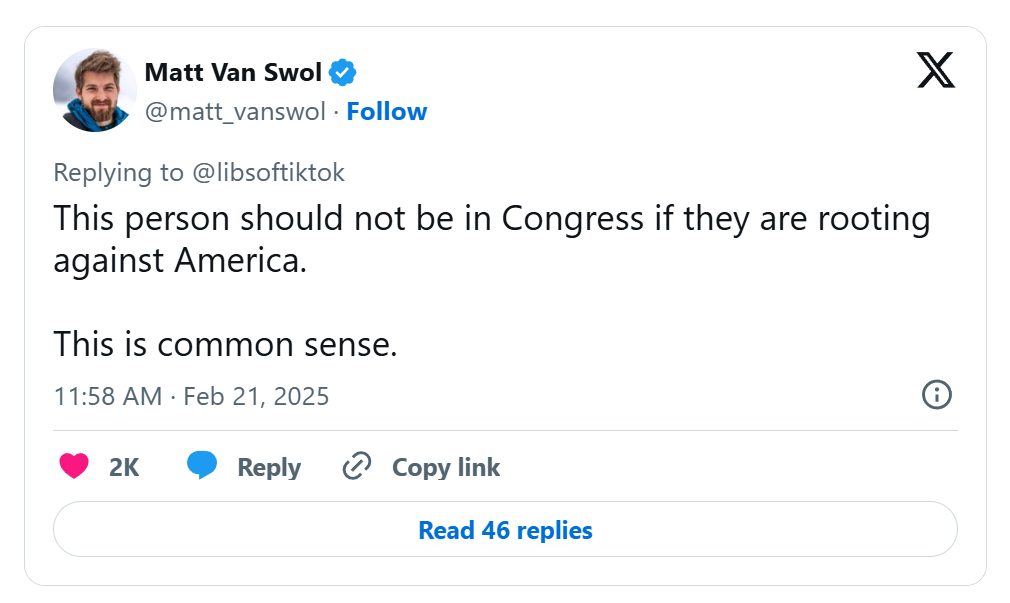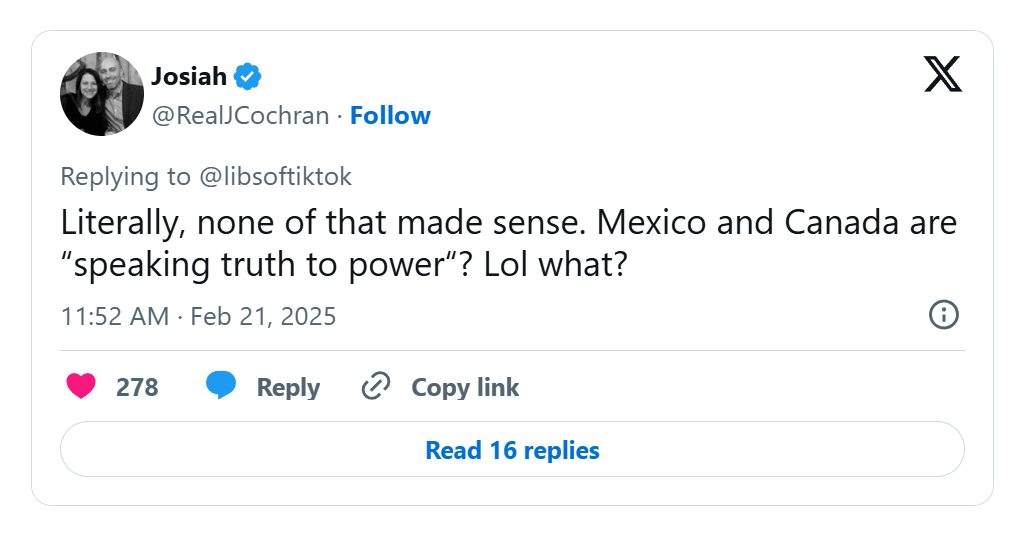
In a series of comments that have sparked intense debate, Representative Jasmine Crockett (D–TX), a prominent member of the progressive “Squad,” recently found herself at the center of controversy over remarks she made during an interview on a widely followed New York City radio show. During the broadcast, Crockett asserted that she was “rooting” for Canada and Mexico—two neighboring nations she lauded for their frankness and their willingness to challenge what she described as a “crazy regime” in the United States. These comments have since drawn widespread criticism from conservative voices and American patriots, who contend that such statements constitute a dismissal of national loyalty and traditional patriotic values.
A Provocative Statement on National Allegiances
During her appearance on The Breakfast Club—a program known for its unfiltered political dialogue—Representative Crockett made statements that have since resonated across social media and various news outlets. “The fact that I’m rooting for Canada and I’m rooting for Mexico a lot is really wild,” she said. Her candid endorsement of these two nations was interwoven with pointed criticism of current U.S. policies and governance. According to Crockett, Canada and Mexico have been “speaking truth to power” in ways that sharply contrast with her assessment of the increasingly dysfunctional nature of American politics. By framing her perspective in this manner, she suggested that the leadership in these foreign nations offers a model of resistance and accountability that is currently lacking at home.
These comments have generated significant backlash among conservative circles. Many critics argue that by extolling the virtues of her neighboring countries, Representative Crockett appears to be undermining American national loyalty. They maintain that her remarks are indicative of a broader trend among progressive lawmakers—where external models are idealized at the expense of addressing the systemic issues plaguing the United States.
The Broader Context: Progressive Politics and the “Squad”
Representative Crockett is not the first member of the progressive “Squad” to draw ire for her outspoken views on domestic and international issues. Colleagues such as Representative Ilhan Omar (D–MN) and Representative Rashida Tlaib (D–MI) have previously faced severe criticism for their controversial statements, particularly those regarding foreign policy and issues of national identity. Similarly, Representative Cori Bush (D–MO) has been the subject of intense debate over her support for policies like defunding the police, despite rising concerns over public safety in her district. In this context, Crockett’s comments are seen by her detractors as part of a pattern of provocative rhetoric that some believe dilutes core American values and diverts attention from the nation’s internal challenges.
In a later interview on The View, Representative Crockett expanded on her views by directly critiquing the policies of former President Donald Trump. She argued that Trump’s approach to governance had dire consequences for rural America, predicting that the closure of rural hospitals and the erosion of critical social safety nets—such as Social Security, Medicaid, and Medicare—would eventually force citizens to confront the long-term implications of electing leaders who prioritize political theatrics over pragmatic solutions. Her remarks, however, have been interpreted by many critics as an oversimplification of complex socio-economic issues, with opponents contending that the decline of rural infrastructure is the result of decades of multifaceted challenges, not solely the outcome of any one administration’s policies.
Criticism and Controversy: Accusations of Anti-American Sentiment
The response to Representative Crockett’s remarks has been swift and polarized. Conservative pundits and American patriots have decried her statements, asserting that they reflect an anti-American sentiment. Many argue that praising foreign nations while harshly criticizing domestic policies undermines the spirit of patriotism and national unity. Critics contend that her comments risk alienating segments of the American public who feel that such rhetoric dismisses the sacrifices and values that have historically defined the nation.
Prominent conservative figures have taken to social media and opinion columns to express their disapproval. Among the most vocal have been commentators who accuse Crockett of prioritizing foreign models over addressing internal issues. They argue that the idea of “rooting” for Canada and Mexico, as stated by Crockett, is emblematic of a dangerous ideological shift—one that places external validation above domestic accountability. To these critics, her statements are not merely an expression of political dissent but an outright repudiation of traditional American values.
In addition, some critics have pointed to Representative Crockett’s remarks as evidence of a broader disconnect between the progressive wing of Congress and the electorate. They assert that by focusing on external comparisons and pointing fingers at domestic leadership, progressive lawmakers risk alienating voters who are struggling with real-world issues such as healthcare, economic inequality, and declining infrastructure. This, they claim, contributes to a growing divide between elected officials and the constituents they serve.
Political Implications and Reactions from Both Sides
Within the halls of Congress and in public debate, Representative Crockett’s comments have ignited a fierce ideological battle over the nature of patriotism and the responsibilities of American leadership. Supporters of Crockett argue that her willingness to speak frankly about the shortcomings of current U.S. policies is a refreshing departure from political doublespeak. They see her remarks as a bold statement of dissent—one that challenges the status quo and calls for a reexamination of what it means to be an American in today’s complex global landscape.
In contrast, critics insist that her comments are not only divisive but also inherently unpatriotic. They emphasize that, in times of economic and social uncertainty, the notion of looking to foreign nations as models for accountability can be deeply damaging. For many, Crockett’s statements are interpreted as a betrayal—a sentiment that resonates strongly among conservative voters who view such rhetoric as an affront to American sovereignty and a dismissal of the nation’s historical legacy.
Further complicating the debate is the broader political context in which these comments were made. Over the past few years, the progressive “Squad” has increasingly come under scrutiny for its provocative stances on various issues, including immigration, foreign policy, and economic reform. The pattern of controversial remarks has led some commentators to argue that members of this group are more interested in making headlines than in offering practical solutions to the problems facing America. In this light, Crockett’s endorsement of foreign nations over the United States is seen as part of a larger trend that many fear could erode the foundation of American national pride and unity.
The Defense: Crockett’s Perspective and Vision for Change
During subsequent interviews and public appearances, Representative Crockett has attempted to clarify her position. She contends that her comments were intended not as a repudiation of America, but as a critique of what she views as a deeply flawed political system. In her view, countries like Canada and Mexico have demonstrated a willingness to “speak truth to power” and to hold their leaders accountable—qualities that, she argues, are in short supply in the current U.S. administration.
According to Crockett, the progressive model she supports is one that embraces transparency, accountability, and a commitment to the well-being of all citizens—especially those in rural and underprivileged areas. Her criticisms of former President Trump’s policies, for instance, are rooted in a concern that his approach has led to the erosion of vital social safety nets and contributed to the decline of critical services, such as rural hospitals. Crockett argues that if the American government is to address these systemic issues, it must be willing to learn from models that prioritize people over politics.
Moreover, Crockett asserts that her remarks were mischaracterized by her detractors. She explains that “rooting” for Canada and Mexico was a metaphor for endorsing a new way of thinking—one that challenges the existing paradigm and calls for innovative solutions to complex problems. For her, it is about finding a balance between national pride and the recognition that no country is perfect, and that even the United States can learn from the successes and failures of its neighbors.
Broader Implications: Patriotism, National Identity, and the Future of Governance
At the heart of this controversy lies a fundamental question: What does it mean to be patriotic in today’s America? As political divisions widen and the challenges facing the nation become increasingly complex, debates over national identity and loyalty have taken center stage. Representative Crockett’s remarks have struck a chord on both sides of the aisle, reflecting a broader ideological struggle over the role of patriotism in modern governance.
For conservatives, patriotism is synonymous with unwavering support for American institutions, traditions, and values. Any deviation from this, they argue, is tantamount to disloyalty—a sentiment that has only grown stronger in recent years. Critics of Crockett contend that by expressing admiration for foreign nations, she is undermining the very foundation of American pride and contributing to a narrative that devalues the sacrifices made by generations of Americans.
On the other hand, supporters of a more progressive vision argue that patriotism should not be blind loyalty but rather a critical engagement with the nation’s policies and practices. From this perspective, acknowledging the strengths of other nations is not an act of betrayal, but rather an opportunity to learn and improve. For these advocates, Representative Crockett’s comments are a call for introspection—a reminder that true patriotism involves holding one’s government accountable and striving for a society that reflects the best of American ideals.
The debate over these issues is far from academic. It touches on the core of how the United States will navigate the challenges of the 21st century—from economic inequality and healthcare reform to immigration and global leadership. As policymakers and citizens grapple with these complex issues, the question of where one’s loyalties should lie—and what constitutes genuine patriotism—remains a deeply contested and emotionally charged topic.
Political Reactions and the Future of the Debate
Since the airing of Representative Crockett’s comments, political reactions have poured in from both sides of the aisle. Conservative commentators have seized upon her words as evidence of a broader trend among progressive lawmakers who appear to prioritize ideological posturing over national interest. They argue that such statements only serve to further polarize an already divided electorate and that they risk alienating voters who are already disillusioned by what they perceive as a disconnect between elected officials and the realities of everyday American life.
In response, some progressive voices have defended Crockett’s remarks, arguing that her candor is a welcome change from the often overly cautious rhetoric that dominates Washington. They maintain that her willingness to challenge conventional wisdom and to question the status quo is precisely what is needed to spark meaningful reform. For these supporters, the controversy is less about disloyalty and more about igniting a broader conversation about the values and priorities that should guide American governance.
Amid these divergent views, one thing remains clear: the debate over Representative Crockett’s remarks is emblematic of the larger ideological battles that define today’s political landscape. It is a debate that raises fundamental questions about the nature of patriotism, the responsibilities of leadership, and the ways in which the United States should position itself on the global stage. As the discussion continues, both critics and supporters are calling for a more nuanced understanding of these issues—one that acknowledges the complexities of modern governance while also holding true to the core principles of accountability and justice.
Conclusion: Navigating the Crossroads of Patriotism and Progress
Representative Jasmine Crockett’s recent remarks have undeniably ignited a firestorm of debate, forcing Americans to confront the evolving meaning of patriotism in a rapidly changing world. While her comments have drawn fierce criticism from those who view them as a betrayal of national loyalty, they have also resonated with others who see them as a bold challenge to the status quo—a call for a more honest and accountable form of governance.
In the end, the controversy is not merely about which country one should root for or the merits of foreign models of resistance. It is about the deeper ideological divide that now defines American political discourse—a divide over how best to address the myriad challenges facing the nation, from economic inequality and healthcare to social justice and national security.

As the nation moves forward, it is clear that the conversation sparked by Representative Crockett’s remarks will continue to evolve. The debate over national identity and what it means to be truly patriotic is far from over, and voices on all sides will no doubt continue to shape the discourse in the months and years ahead. Whether one views Crockett’s comments as a provocative call to action or as an irresponsible dismissal of American values, the discussion they have ignited is a necessary part of a vibrant, democratic society.

Ultimately, the controversy serves as a reminder that patriotism is not a static concept—it evolves with the times and is subject to interpretation and debate. In a nation as diverse and dynamic as the United States, the challenge for all of us is to engage with these debates thoughtfully and constructively, striving for a future where our policies and practices reflect both our enduring traditions and our aspirations for progress.
In this turbulent political climate, the remarks made by Representative Crockett highlight the importance of robust public discourse and the need for elected officials to articulate their visions for the country, even when those visions challenge long-held beliefs. As Americans grapple with questions about national identity and the best path forward, it is crucial that we do not shy away from difficult conversations—no matter how controversial they may be.
In the end, the debate over Representative Crockett’s comments is more than a partisan dispute; it is a reflection of the complex and often contradictory nature of American democracy itself. It forces us to ask difficult questions about where our loyalties lie and how we can build a nation that is both proud of its heritage and committed to continuous improvement. As this debate continues to unfold, one thing is certain: the discussion over the future of American patriotism will remain one of the most critical and contested issues of our time.
Leave a Reply